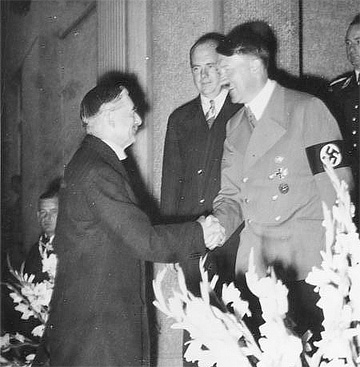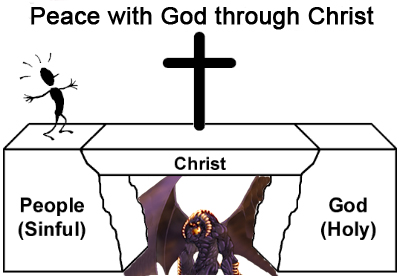So far in this series I’ve shown that God created this world with the intention that it be full of peace. But human sin twisted God’s creation, so that brokenness now pervades that which God had intended to be so peaceful. Yet God has not given up on his creation, nor on his creatures.
In the Old Testament God promised to mend that which had been lost in the Fall by reinstituting peace on earth. Through Ezekiel, the Lord looked forward to such restoration for his people:
And I will make a covenant of peace with them, an everlasting covenant. I will give them their land and multiply them, and I will put my Temple among them forever. I will make my home among them. I will be their God, and they will be my people (Ezek 37:26-27).
Peace will come by God’s effort. The result will be material blessing and, most importantly, a mended relationship between people and God. The prophet Isaiah brought a message similar to that of Ezekiel:
How beautiful upon the mountains are the feet of the messenger who announces peace, who brings good news, who announces salvation, who says to Zion, “Your God reigns” (Isa 52:7).
Notice how God’s peace is integrally related to his salvation, to the restoration of his reign on earth. When God saves, he will restore his kingdom so that those who live under his rightful rule will experience the fullness of his peace.
Isaiah’s vision of God’s future peacemaking effort takes an unexpected turn in the next chapter. There the prophet describes God’s Suffering Servant, “a man of sorrows, acquainted with bitterest grief” (Isa 53:3). This Servant suffers, not because of his own sins, but so that we might be forgiven for our sins. “But he was wounded and crushed for our sins. He was beaten that we might have peace. He was whipped, and we were healed!” (Isa 53:5). God would restore peace on earth, but only through one who took upon himself the penalty for human sin.
Jesus entered the world as the one who would fulfill the mission of the Suffering Servant, thus bringing divine peace. Even before Jesus was born, one of his relatives proclaimed what God was about to do:
By the tender mercy of our God, the dawn from on high will break upon us, to give light to those who sit in darkness and in the shadow of death, to guide our feet into the way of peace (Luke 1:78-79)
Upon the occasion of Jesus’s birth, angels filled the sky with praise to God. What did they sing? “Glory to God in the highest heaven, and peace on earth to all whom God favors” (Luke 2:14).
Peace on earth sounds just great, doesn’t it? It also sounds like something you might read on a tacky poster in college dorm, or like something cooked up by a politician to win a few extra votes in the next election. Or it sounds very much like something a British Prime Minister once said, to his ultimate shame.
In March 1938, Germany absorbed Austria under the leadership of Adolf Hitler. Then, turning his eyes to Czechoslovakia, Hitler and his generals drew up a plan to take over that sovereign nation as well. As war between Germany and Czechoslovakia seemed imminent, the Czechs looked to their allies, France and Great Britain, for help. But the French and the British were eager to avoid a war with Hitler’s military machine.
In September 1938, the British Prime Minister Neville Chamberlain, in partnership with French leaders, began negotiations with Hitler. Things appeared hopeless, however, because Hitler insisted on Germany’s right to annex a substantial portion of Czechoslovakia. Yet Prime Minister Chamberlain was so eager to avoid war that he caved in to Hitler’s demands. Hitler did promise, however, to resolve all future differences through consultation rather than military action. A trustworthy promise to be sure! (Photo: Chamberlain and Hitler)
 In October 1938, Neville Chamberlain returned to jubilant crowds throughout Britain, announcing that he had achieved “peace with honour. I believe it is peace in our time.” Of course we know the rest of the story. Within months, Hitler had annexed the rest of Czechoslovakia and would soon invade Poland. “Peace in our time” was no peace at all because it failed to remedy the root cause of the strife: Hitler’s plan to dominate Europe.
In October 1938, Neville Chamberlain returned to jubilant crowds throughout Britain, announcing that he had achieved “peace with honour. I believe it is peace in our time.” Of course we know the rest of the story. Within months, Hitler had annexed the rest of Czechoslovakia and would soon invade Poland. “Peace in our time” was no peace at all because it failed to remedy the root cause of the strife: Hitler’s plan to dominate Europe.
Similarly, the biblical slogan “Peace on earth” doesn’t mean much unless God deals with the basic human problem of sin. Peace doesn’t come along just because baby Jesus was born in a manger. It isn’t a by-product of Christmas cheer or other happy thoughts. Jesus’ birth was only a prerequisite to his final peacemaking effort, something we celebrate during Holy Week, not during Christmas. As a human being, the Word of God made flesh, Jesus represented us on the cross. He bore our sin as had been prophesied for the Suffering Servant in Isaiah 53. His death dealt a fatal blow to sin, the root cause of human brokenness and separation from God. Because Jesus was crucified, we can have peace in all of its fullness (Isa 53:5). Paul triumphantly celebrates Jesus’ peacemaking work in the opening of his letter to the Colossians:
For God in all his fullness was pleased to live in Christ, and by him God reconciled everything to himself. He made peace with everything in heaven and on earth by means of his blood on the cross (Col 1:19-20).
The peace God intended for creation – once lost because of sin, often promised by the prophets – God reestablished through Jesus by “his blood on the cross.” For this reason Paul can say simply of Christ: “he himself is our peace” (Eph 2:14; NIV).
But what are the dimensions and implications of the peace Jesus has wrought on the cross? What kinds of peace can we expect to experience through believing in Jesus? I address these questions in future posts in this series.
peace.
This post is part of a series: Seeking the Peace of Christ: Peacemaking and Christianity. You can read or link to the series by clicking on the series title.

